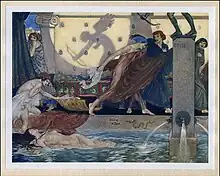Idyll XXIII, also called Εραστής ('The Lover'), is a poem doubtfully attributed to the 3rd-century BC Greek poet Theocritus.[1] It tells how a lover hanged himself at the gate of his obdurate darling who, in turn, was slain by a statue of Love.[2]
Summary
The poem purports to be sent by a lover to his neglectful beloved.[1] The author tells how in a like case unrequited friendship led to the suicide of the one, and to the death of the other at the hands of an effigy of Love.[1]
Analysis

According to J. M. Edmonds, the actual death of a boy through the accidental falling of a statue probably gave rise to a folk-tale which is here put into literary shape.[1]
Authorship
This poem, known to the Latin poets, cannot be attributed with much certainty to Theocritus, and is found in only a small proportion of manuscripts, the text of which is corrupt.[1][2][3]
References
Sources
- Cholmeley, R. J., ed. (1919). The Idylls of Theocritus (2nd ed.). London: G. Bell & Sons, Ltd. pp. 344–47.
Attribution: ![]() This article incorporates text from these sources, which are in the public domain.
This article incorporates text from these sources, which are in the public domain.
- Edmonds, J. M., ed. (1919). The Greek Bucolic Poets (3rd ed.). William Heinemann. pp. 277–85.
- Lang, Andrew, ed. (1880). Theocritus, Bion, and Moschus. London: Macmillan and Co. pp. 113–16.
Further reading
- Copley, F. O. (1940). "The Suicide-Paraclausithyron: A Study of Ps.-Theocritus, Idyll XXIII". Transactions and Proceedings of the American Philological Association. 71: 52–61.
- Fawkes, Francis (1767). The Idylliums of Theocritus. London: Dryden Leach. pp. 218–23.
External links
 Greek Wikisource has original text related to this article: Εραστής ή Δύσερως
Greek Wikisource has original text related to this article: Εραστής ή Δύσερως- "Theocritus, Idylls, ἐραστής". Perseus Digital Library.
- "From the series: 'Idylls of Theocritus' – (XXIII) The Lover, 1954". National Gallery.